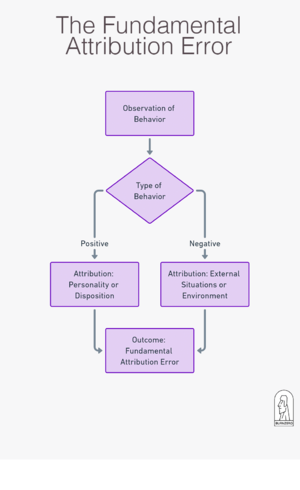Fundamental attribution error: Difference between revisions
From BurnZero
No edit summary |
mNo edit summary |
||
| (4 intermediate revisions by the same user not shown) | |||
| Line 1: | Line 1: | ||
<html><iframe width=" | <html><iframe width="100%" height="315" src="https://www.youtube.com/embed/HR_q96-YRzk" title="YouTube video player" frameborder="0" allow="accelerometer; autoplay; clipboard-write; encrypted-media; gyroscope; picture-in-picture" allowfullscreen></iframe></html> | ||
The fundamental attribution error (also known as correspondence bias or over-attribution effect) is the tendency for people to over-emphasize dispositional, or personality-based explanations for behaviors observed in others while under-emphasizing situational explanations. | [[File:Fundamental Attribution Error Cognitive Bias.png|alt=Fundamental Attribution Error Cognitive Bias|thumb|'''Figure 1'''. Fundamental Attribution Error Flowchart]] | ||
'''The fundamental attribution error (also known as correspondence bias or over-attribution effect) is the tendency for people to over-emphasize dispositional, or personality-based explanations for behaviors observed in others while under-emphasizing situational explanations.''' | |||
In other words, people have a cognitive bias to assume that a person's actions depend on what "kind" of person that person is rather than on the social and environmental forces that influence the person. | In other words, people have a cognitive bias to assume that a person's actions depend on what "kind" of person that person is rather than on the social and environmental forces that influence the person. | ||
Latest revision as of 01:01, 19 October 2023
The fundamental attribution error (also known as correspondence bias or over-attribution effect) is the tendency for people to over-emphasize dispositional, or personality-based explanations for behaviors observed in others while under-emphasizing situational explanations.
In other words, people have a cognitive bias to assume that a person's actions depend on what "kind" of person that person is rather than on the social and environmental forces that influence the person.
